Samsung Galaxy S6 vs Apple iPhone 6: first look
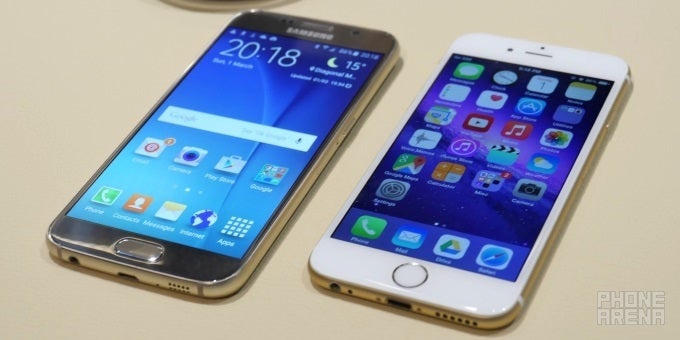
Introduction
We're at MWC 2015, folks, and here in our hands, we have the best Samsung Galaxy S, and the best Apple iPhone ever! Now that the storm brewed by the S6's announcement has dwindled a bit, we're going to sit down with them and have a brief, but thorough first look at how the two are about to compete in the months ahead.
Design
While the Samsung Galaxy S4 and Galaxy S5 were the most forgettable Android flagships around, the Galaxy S6 is one to remember. This time, Galaxy S owners won't be holding creaky plastic in their hands. Instead, they will get to know something much more capable of standing up to the iPhone 6 - a blend of metal and glass that's premium indeed! Fully paneled with tough Gorilla Glass 4, and rocking a sculpted aluminum frame, the smartphone is durable enough to withstand the rigors on daily use, but makes no design compromises. And not only is the Galaxy S6 full-on premium, but it will come in a four lively colors too! But how will it sit in your palm? Well, dimensions-wise, the Galaxy S6 measures 5.64 x 2.79 x 0.27 inches (143.3 x 70.81 x 6.8 mm), which means it won't sit in there much worse than the iPhone 6 does - and that's despite the bigger display Samsung's challenger has.
Display
The display is the window to your smartphone's potential. The Samsung Galaxy S6 and iPhone 6 have completely different displays at the heart of their user experience. The S6, being stuffed with technology to the brim, rolls with a Quad-HD (1440x2560) resolution AMOLED display which packs a whopping 3,686,400 pixels on a panel that's 5.1 inches by diagonal! This results in a mind-boggling pixel density of 576 pixels per inch.
Meanwhile, the iPhone 6 only has a 4.7-inch IPS LCD screen with a resolution - 750x1334 - that seems laughably low in comparison. Its pixel density is "only" 326 PPI. Does that really matter? To us, it really doesn't. We like sharp screens, but we consider a display's color reproduction, image quality, and brightness levels as more important than the number of pixels per inch. And to get an accurate assessment of how the Galaxy S6 performs in these aspects, we'll have to put the former through our display test first. Still, at first sight, the S6 exhibits something close to the color accuracy that the Galaxy Note 4 wowed us with. So things are looking pretty good!
Processor and memory
Raw spec comparisons between Android and iOS devices never made sense, because the two operating systems have vastly different architectures. Software optimization explains why an iPhone 6 with its dual-core 1.4GHz processor and 1GB of RAM can stand up to the Samsung Galaxy S6 and its monstrous 2.1GHz octa-core Exynos 7420 chipset (that's also paired with 3GB of super-fast LPDDR4 RAM) for all tasks that don't throw 4K video in the equation. However, Samsung might have worked out a serious performance enhancer for the Galaxy S6 - its UFS 2.0 flash storage is said to be 2.7 times faster than the current NAND flash memory standard, and it could bring a tangible improvement to app and content load times over other smartphones. In terms of built-in storage memory, both the iPhone 6 and Galaxy S6 have up to 128GB of the stuff - non-expandable via microSD card, sorry.
Interface and functionality
At this point, comparing TouchWiz-skinned Android and Apple's iOS is, for the most part, pointless. They are two of the most popular operating systems in existence! You know full well what to expect from them. That's why we're going to focus on something different - it's called Samsung Pay. Yes, those rumors of Samsung working up a competitor to Apple Pay blossomed into truth! Samsung Pay, touted by yours truly as an "easy to use mobile payment service that will be compatible with more locations than any competing offering in a single application", is set to launch in the United States in the second half of 2015. It hopes to one-up Apple Pay with Samsung KNOX-protected fingerprint scanning and advanced tokenization security.
The system works with both NFC and MST (magnetic secure transmission) terminals and is "device, merchant, and card issuer agnostic" - which probably means that it's supposed to work almost anywhere, with almost all terminals and merchants in the USA. Apple Pay is already successful on the US market, so we're rather curious whether Samsung Pay will be able to successfully attack its niche!
In addition, the Galaxy S6 features a heart-rate sensor, which is able to measure your pulse or double as a shortcut for camera-related functions. That, the iPhone 6 doesn't have - but the upcoming Apple Watch will fill in for that role.
For better or worse, those 20MP camera rumors didn't pan out in the Samsung Galaxy S6. It comes with a respectable 16MP unit on the back instead, while the front cam has been upgraded to 5 megapixels. The camera boasts Auto Real-Time HDR, Smart Optical Image Stabilization, and IR Detect White Balance features for advanced light sensitivity. In addition, it's got a brand-new 'Quick Launch' gesture which lets users simply double-press the home button and launch the camera app in 0.7 seconds (yes, Samsung measured it). Having had a great ride with the Galaxy Note 4's 16MP camera, we can't wait to take the Galaxy S6 out on a low-light photo taking spree! We also noted that the Galaxy S6 has a really fast camera app this time around.
Camera
For better or worse, those 20MP camera rumors didn't pan out in the Samsung Galaxy S6. It comes with a respectable 16MP unit on the back instead, while the front cam has been upgraded to 5 megapixels. The camera boasts Auto Real-Time HDR, Smart Optical Image Stabilization, and IR Detect White Balance features for advanced light sensitivity. In addition, it's got a brand-new 'Quick Launch' gesture which lets users simply double-press the home button and launch the camera app in 0.7 seconds (yes, Samsung measured it). Having had a great ride with the Galaxy Note 4's 16MP camera, we can't wait to take the Galaxy S6 out on a low-light photo taking spree! We also noted that the Galaxy S6 has a really fast camera app this time around.
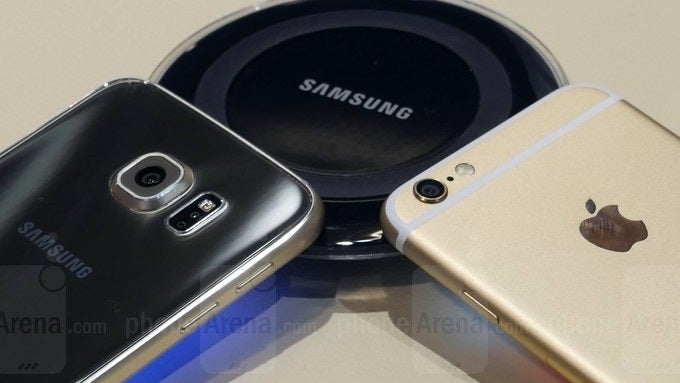
The iPhone 6, meanwhile, packs just an 8-megapixel main camera and a 1.2-megapixel FaceTime front camera. Megapixels aren't all that make or break a digital camera, though. The iPhone 6's camera - which is one the world's most popular cameras, by the way - is tuned to take remarkably sweet photos that nail the right balance between natural and artificially-sweetened colors. It also fares pretty good in the low-light shooting department, and takes pictures very quickly. In other words, it gives you everything you want from a point-and-shoot cam, but if you want larger photos and 4K video shooting, you'll have to pick up the Galaxy S6 (or an equivalent).
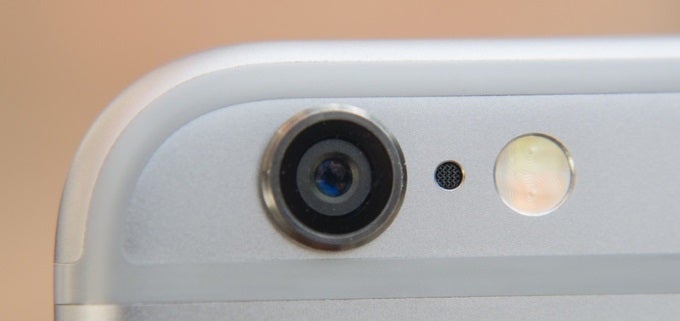
Battery life
The Samsung Galaxy S6 packs a 2550mAh unit, which sounds a bit less reassuring than we'd like it to. However, Samsung is giving it a pretty good prognosis! It should last a whopping 12 hours of Wi-Fi browsing, 11 hours of browsing over LTE, up to 13 hours of media playback, and up to 49 hours of music playback with the display turned off! But still, we'd rather let our proprietary battery test be the final authority on the matter. In addition, the Galaxy S6 comes with fully embedded wireless charging, working with any wireless pad on the market that supports WPC and PMA standards. Not only that, but Samsung also developed a fast wired charging solution that's able to give you 4 hours of usage after just 10 minutes on the charger. Once again, we'll have to see about that.
Conclusion
The Samsung Galaxy S6 will be sold globally from April 10, in 32/64/128GB variants. At first glance, it's one of the best competing products the iPhone 6 is about to face this year, and if Samsung prices its flagship right, it might have a chance to win people back for the Galaxy S smartphone, the model citizen of Android phones. Those who don't have an iPhone 6, or aren't lusting after one, that is.
Follow us on Google News





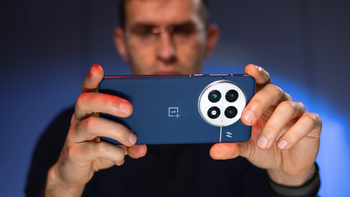

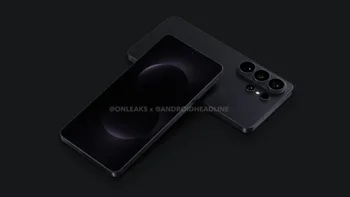
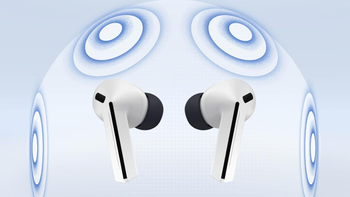





Things that are NOT allowed:
To help keep our community safe and free from spam, we apply temporary limits to newly created accounts: